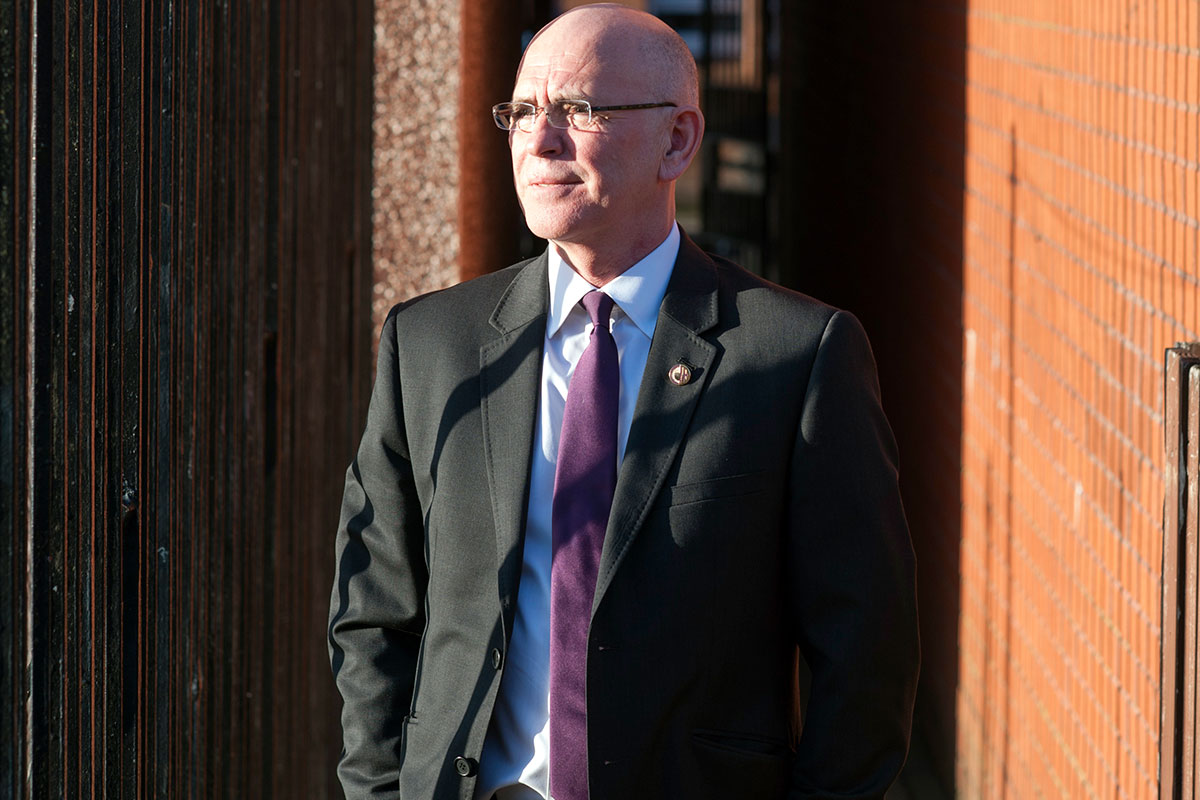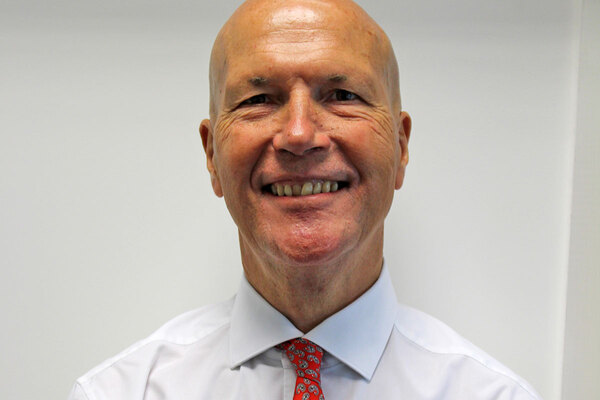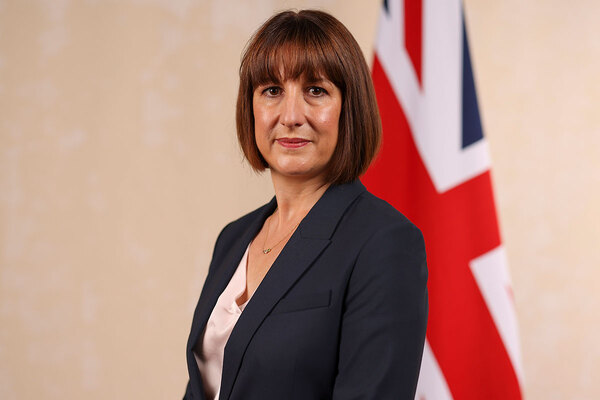New Wheatley CEO: ‘We are duty bound to keep the rent increase as low as we can’
New CEO of Wheatley sets out his stall in an interview with Martin Hilditch, including a pledge to give 60% of its new lets to homeless households, set some of the lowest housing association rent increases and prioritise delivery of social rent. Photography by Martin Hunter
Scotland’s largest social landlord, Wheatley Group, and its new chief executive, Steven Henderson, seemed almost destined to cross paths.
Mr Henderson’s father, David, was a former head of the housing division at the Scottish Executive (the forerunner to the Scottish government), at a time when Glasgow Council was thinking about transferring its 80,000 homes to a social landlord to improve conditions and drive investment.
“The concepts of housing stock transfers and different programmes of government investment were something I learned about growing up,” Mr Henderson says. There are other strange little connections, too. After he took over as chief executive, Mr Henderson found out that one of his best friends is the great, great niece of John Wheatley, the Labour politician whose Housing Act 1924 saw central government provide subsidies to build public housing and – spoiler alert – is who the group was named after.
He is meeting Inside Housing in Wheatley’s Glasgow head office almost 20 years to the day since Glasgow Council transferred its homes to Glasgow Housing Association (now a subsidiary of Wheatley Group called Wheatley Homes Glasgow).
Mr Henderson’s predecessor, Martin Armstrong, oversaw a decade of growth, including a merger with 10,300-home Dumfries and Galloway Housing Partnership (DGHP) in 2019 and Edinburgh’s 5,000-home Dunedin Canmore housing association in 2015.
Finance background
We are speaking with Mr Henderson to find out more about Wheatley’s new chief executive and how he is looking to make his mark. He might be steeped in the group’s history – he has been its finance director for much of the past decade – but to what extent will his leadership mark a break with the past?
Mr Henderson’s background is in finance. He trained as a chartered accountant and worked with PwC, Ernst & Young (on the housing and regeneration advisory team, which advised on the Glasgow stock transfer), and the European Investment Bank, lending to housing providers across the UK and beyond.
“I always understood that money was the key to things,” Mr Henderson says of his training – and it is clear from our conversation that his interest is very much in what that money can deliver for communities. “Public service and the ethos of that was always in my family,” he states. Social housing, particularly, “was in the blood”.
He joined Wheatley as it was embarking on its first public bond issue. “The first project I worked on, we raised £300m and built 2,800 new homes,” he says.
The group’s focus has very much been on social housing – Wheatley has built more homes for social rent than any landlord in the UK over the past seven years, according to Inside Housing’s annual survey of
the top developing housing associations.
This is something that Mr Henderson wants to continue. The Scottish government has set out its intention to build 110,000 affordable homes by 2032, of which at least 70% will be for social rent. Mr Henderson is keen to outperform this if possible.
“Our programme is about 75% social,” he states. “It has got a very heavy focus towards social housing. That is something I’m very proud of.”
But a focus on numbers alone is not enough, he says. There were 9,130 children in temporary accommodation in Scotland in 2022, almost 2,000 more than in 2019. For Mr Henderson, this means: “We need to consciously build more family housing, with three, four or five bedrooms into our programme – we’ve done that for the first time this year.”
Of course, even for a landlord committed to social rent or family housing, the policy environment is crucial. Glasgow’s strategic housing investment plan, for example, pledged to help fund the delivery of additional family-sized affordable homes and grant rates for new build (around £78,000 for social rent) are considerably higher than in England.
“I cannot complain about the grant support – it’s the envy of Europe,” he says, adding that he expects support for social housing to continue whoever wins the SNP leadership election.
In turn, this has helped Wheatley make housing decisions that differ from similar-sized social landlords in England. For starters, the group has committed to giving 60% of its new lets each year to homeless households. By comparison, around a fifth of new lettings in England in 2020-21 were to statutorily homeless households. There is a policy context here – rapid rehousing is a central part of Scotland’s approach to ending homelessness, with local authorities across the country charged with developing rapid rehousing transition plans.
“As the largest organisation nationally in providing affordable housing, we had a clear role to increase the number of lets to homeless people and families,” Mr Henderson states. “It was both an ask of local authorities and something we wanted to do anyway. And 60% is a major contribution. Over the period of our strategy, there will be at least 10,000 homeless people given a home with Wheatley – and after two years, we are at over 4,000 already.”
The move has helped the organisation unlock funding to deliver more housing too, with £100m new loan facilities last year linked to environmental social and governance (ESG) criteria, including targets for providing homes to homeless people.
Tenancy sustainment rates have “fallen fractionally” since lettings to homeless families increased, Mr Henderson says, but “that’s probably more to do with the general cost of living”.
Part of that commitment includes doing more to house Ukrainian refugees, displaced by the war with Russia, Mr Henderson says. Last year, Wheatley made an initial commitment to house 300 Ukrainian refugees – and the landlord has now increased its plans to more than 700. “We think we are the only housing association to make a pledge like that,” he says.
“We were asked by government if we could commit some homes,” he adds. “But we were watching TV and seeing the terrible plight of people who had come from Ukraine with nothing. And it was the right thing to do to offer to help.”
If this is the plan for new and future residents, what of existing tenants? Mr Henderson says that in the short term, “coming into the role, the key focus has really been on supporting our tenants through this period of the winter, with the cost of living situation”. This includes a £6m “here for you” welfare fund.
Due to the cost of living crisis, rent-setting has come under intense scrutiny across the UK this year. In England, the government imposed a rent cap of 7% on social landlords – with most plumping for the maximum increase. The Scottish government decided against imposing a cap on social rents in the country – although landlords in Scotland have to consult on rent levels with tenants and prove they have taken affordability into account.
So, what is Wheatley doing under Mr Henderson’s leadership? Because of its structure, the group consulted separately with residents in each of its subsidiaries, to talk about what rent increases they wanted to see – and the impact on service delivery of each of the options.
This local approach has led to differences in the percentage increases in different areas. Tenants of the group’s biggest subsidiary, 42,000-home Wheatley Homes Glasgow, will see an average rent increase of 3.9% (£3.61 a week). Wheatley Homes South residents will see rents increase by 4.4%. These are both below the rate of many other housing associations in Scotland, and well below the majority of English associations.
“A housing officer said to me the other day, ‘Folks don’t have two pennies to rub together,’” Mr Henderson says. “That is true. I can’t hide from that fact. We are duty bound to keep the rent increase as low as we can, while protecting investment and crucial things like the repairs service and keeping tenants safe in their homes.”
Focus groups
In terms of the decision-making process, Wheatley held independent focus groups in different parts of the country and conducted doorstep interviews with tenants about their preferred options. It talked about the potential trade-offs of different options and tenants voiced their collective opinion about the approach that should be taken in different areas.
“We said to keep our business plan at the same levels of investment – capital investment and stock – as assumed a year ago, we would have to do a 6.5% increase,” Mr Henderson says. The 3.9% increase in Glasgow was the lowest the organisation felt it could go and maintain statutory compliance, and avoid “a significant impact on services and investment”.
This could involve carrying out some planned maintenance over a slightly longer time.
The other big area in which social landlords have come under scrutiny in recent months relates to damp and mould problems. This follows the tragic death of toddler Awaab Ishak in a home owned by Rochdale Boroughwide Housing (RBH) in 2020. An inquest last year concluded that Awaab died from a respiratory condition caused by exposure to mould in his home – an issue that had been raised repeatedly with RBH.
Since the inquest, English housing secretary Michael Gove has said the government will introduce ‘Awaab’s Law’ – new legislation to force landlords to investigate and fix serious problems with damp and mould within strict time limits. Timeframes of 14 days for a landlord to investigate a problem and seven days to carry out repairs are being discussed, leading to much debate in the sector about the practicalities of those time limits.
If some landlords are concerned about those time limits, Mr Henderson is not one of them. While Awaab’s Law will not affect Scottish landlords, Wheatley Group had decided to adopt a similar policy before Mr Gove talked about introducing a law in England.
“Our board approved a new damp and condensation policy approach on 21 December,” he says. “Coming in as the new CEO, it was incumbent on me to just take a step back and look at everything we were doing once again. We have tightened some of our policies and approaches. For example, we commit to being out to see and inspect mould, damp and condensation within 40 hours of it being reported. And our target is to fix the underlying root cause within 15 days [compared to its previous target of 30 days] from that point.”
Of course, the word “target” is notoriously elastic. What does Mr Henderson mean by it? By and large he means a hard and fast rule which the organisation would “make ourselves justify strongly any exceptions from that”.
For example, if it turned out a roof needed replacing, that may take more than 15 days, but “there would have to be an exception” from the general rule.
“It’s zero tolerance,” he adds. “It’s not acceptable for customers to live with mould and damp in their home.”
While there might be changes to policy in some areas, it is clear that, as someone so intimately involved in the recent history of Wheatley Group, Mr Henderson is not going to veer off on a wildly different course.
“I was never going to rip it all up and start again because I had been a believer in what we had built and created,” he adds.
While there might be no radical departures for Wheatley, it certainly presents an alternative approach to some of its peers elsewhere in the UK.
Sign up for our Scotland newsletter
Already have an account? Click here to manage your newsletters













